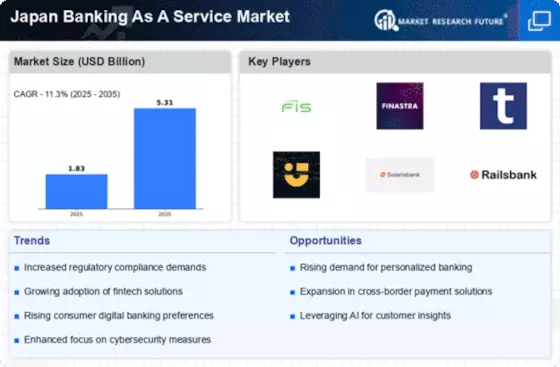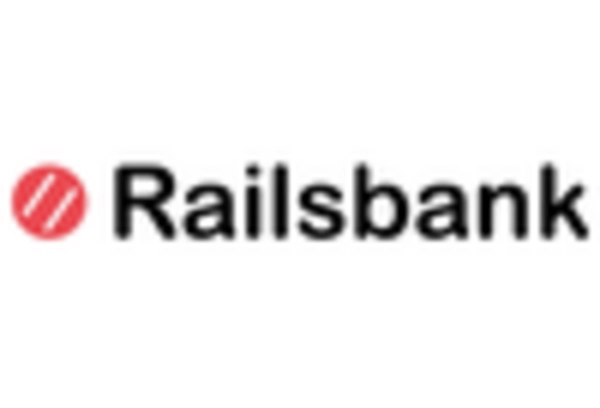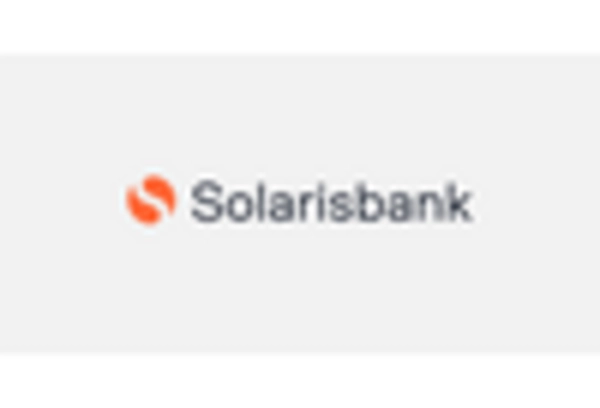Shift Towards Open Banking
The concept of open banking is gaining traction within the Japan Banking As A Service Market. Open banking allows third-party developers to access bank data through APIs, fostering a more competitive landscape. This shift is driven by consumer demand for personalized financial services and the need for banks to differentiate themselves. Recent statistics indicate that approximately 60% of Japanese consumers are open to sharing their banking data for better services. As banks embrace open banking, they are likely to collaborate with fintech firms to create tailored solutions, thereby enhancing customer satisfaction and driving growth in the Japan Banking As A Service Market.
Focus on Financial Inclusion
Financial inclusion remains a critical driver in the Japan Banking As A Service Market. Despite Japan's advanced economy, certain demographics, including the elderly and low-income individuals, face barriers to accessing traditional banking services. The rise of Banking As A Service offers a potential solution by providing accessible financial products through digital platforms. Initiatives aimed at promoting financial literacy and digital banking adoption among underserved populations are gaining momentum. By addressing these gaps, the Japan Banking As A Service Market can expand its customer base and contribute to a more inclusive financial ecosystem.
Regulatory Support for Innovation
The Japan Banking As A Service Market benefits from a regulatory environment that encourages innovation. The Financial Services Agency (FSA) has implemented various initiatives aimed at fostering fintech development. For instance, the FSA's regulatory sandbox allows startups to test new financial products in a controlled environment. This supportive framework is crucial for the growth of Banking As A Service, as it enables companies to experiment with innovative solutions without the burden of extensive regulatory compliance. As a result, the Japan Banking As A Service Market is likely to see an influx of new entrants and innovative services, enhancing competition and consumer choice.
Increased Demand for Digital Banking Solutions
The Japan Banking As A Service Market is experiencing a notable surge in demand for digital banking solutions. As consumers increasingly prefer online and mobile banking options, traditional banks are compelled to adapt. According to recent data, over 70% of Japanese consumers utilize digital banking services, indicating a shift in consumer behavior. This trend is further fueled by the rise of tech-savvy millennials and Gen Z, who prioritize convenience and accessibility. Consequently, banks are seeking partnerships with fintech companies to enhance their digital offerings. This collaboration not only improves customer engagement but also streamlines operations, thereby driving growth in the Japan Banking As A Service Market.
Technological Advancements in Banking Infrastructure
Technological advancements are reshaping the Japan Banking As A Service Market. The integration of artificial intelligence, machine learning, and blockchain technology is enhancing operational efficiency and security. Banks are increasingly investing in modernizing their IT infrastructure to support these innovations. For instance, the adoption of AI-driven chatbots for customer service is becoming commonplace, improving response times and customer satisfaction. Furthermore, blockchain technology is being explored for secure transactions and fraud prevention. These technological developments not only streamline banking operations but also position the Japan Banking As A Service Market for future growth and competitiveness.
















